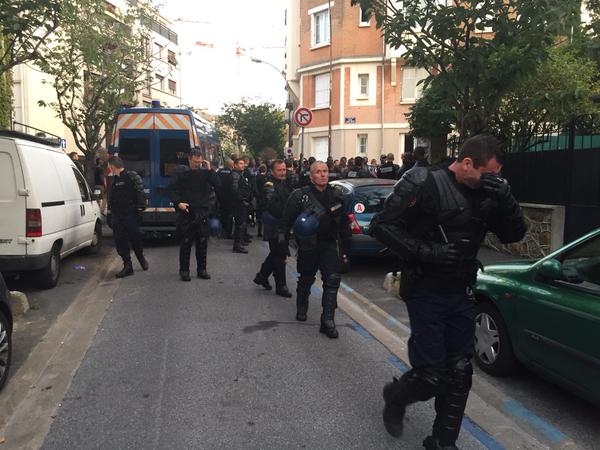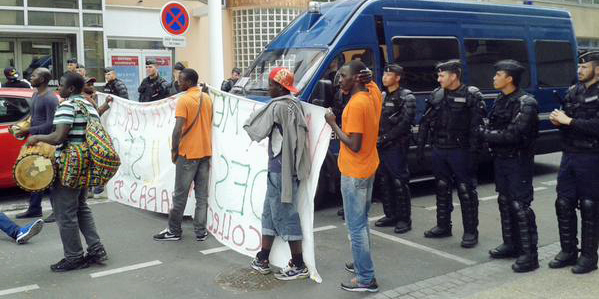Early morning on Monday August 31st, seven JEDI climate justice activists gathered at the Baras squat in Les Lilas, in the Parisian suburbs. The town is situated in the 93 department of France, a few kilometers from the Bourget, where the Paris Climate Talks, the COP21, will take place in three months.
Four of us had spent the night there with a refugee collective called The Baras (“workers” in Bambara). They were all men, and most of them came from Mali. Many had been working there, in gold mines, for Western corporations, and faced repression when they organised to demand better pay and working conditions. In the end, they were threatened with prison sentences, and had to flee the country. Many of them had fled the war in Libya and had crossed Italy and France before making it to the Parisian suburbs. They now work long hours as undocumented workers in the city, and have no possibility of finding any housing as long as French immigration services deny them the necessary administrative status. The occupied building had been empty for months, and its inhabitants had proof they been living in it for 10 days. French law was therefore on their side: any police action to evict people occupying empty buildings is illegal beyond 48 hours.
As rumours of an imminent eviction loomed, we knew we had to support the collective to try and resist any possible police intervention. Most of us stayed up all night, drinking hot coffee on the sidewalk and keeping an eye on the street corners. At 6:00 am, a police car cruised past our front door, asking the group what we were doing. Having coffee, we replied. As the sun was rising, at 7:30 in the morning, 4 trucks filled with riot police parked at the corner of our street. We quickly locked arms and tried to block the front door. Our forces were insufficient. Within 15 minutes, they managed to remove us, knock the door down and empty the building… The clamour wakes the neighbours who watch the intervention from their windows.

The intervention was violent and tear gas was used. A member of the Baras collective was arrested. This prompted us to make our way to the municipality of Les Lilas, and finally to the police station in Bagnolet (a neighboring town also situated in the 93 department), where our comrade was detained. We stayed several hours in front of the police station to demand he be let out. He finally was let go at around 15:30.
Since then, we have learned that the collective has reclaimed its former squat in Bagnolet, but an eviction notice has been issued for September 23. A demonstration is being organised to resist this decision.
Urban cleansing is in full force in Paris. The conjunction of the COP21, which will bring tens of thousands of people in the city, with the 2016 Football Euro Cup, is prompting authorities to “clean the city”, i.e., crack down on all the people who are best kept invisible for such high-profile events. Because apparently the image of our country is more important than the well-being and safety of the most vulnerable parts of the population.
Zero tolerance policy has been put in motion for more than a year now. The crackdown targets homeless people, inhabitants of shanty homes and squats, Roma people, refugees, but also organisations that work to provide assistance to vulnerable populations. Organisations that have been serving hot meals to homeless people for decades have now been prohibited from doing so. As they refused, the police teared down their tables and equipment… It’s important to note at this point that due to rising poverty, the percentage of homeless people in France has risen by 50% in the last ten years.

Little girls from in Le Samaritain, one of France’s oldest shantytowns near Le Bourget where 300 people were living. The 90 families were evicted on August 28 at dawn, under pouring rain, with no housing solutions offered to them by French authorities.
In December, the French government will claim to be acting for the good of humanity, it will claim to be doing everything in its power for such a pressing matter as climate change. But actions speak louder than words. We’ve seen the true face of the “humanism” they speak of. We’ve seen the evictions of refugees for months on end, we’ve seen the crystal-clear unwillingness to find solutions for homeless people, we’ve seen the unchecked police brutality in Calais and in our cities.
They are cleaning the streets. This is not justice. And we will fight this injustice, just like we fight climate change.
Adèle, Clémence and Angie
We are three climate activists living in Paris.


